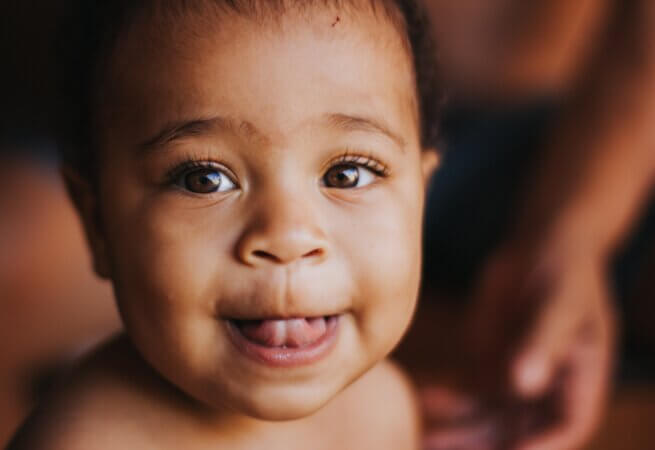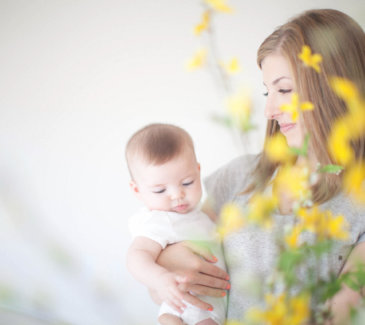I balanced a small box of baby clothes on top of my bump and stretched to reach the remaining box on the floor. “Bethany!” I heard my grandmother’s stern voice from the other room. “You better not be moving those boxes by yourself.”
“I’ve got it!” I yelled back, then huffed. I’m only seven months pregnant; I’m not an invalid. My husband had left for military training the same day my nesting instinct kicked into gear. Impatient to wait for him, I took the hammer in my own hands to prepare our firstborn’s nursery.
I moved the boxes quietly, hoping my grandmother wouldn’t hear me step on the stool to reach the top shelf of our overstuffed apartment closet. “Bethany, get down from there!” she demanded, now standing behind me. I couldn’t disobey her stern voice this time, and I lowered my swollen feet to the floor.
Her wrinkled, yet strong, fingers clasped my puffy hands. “You have to ask for help.” She spoke tenderly, yet firmly. “You weren’t meant to do this alone.”
Community is very good
“When God saw everything that he had made”—from the smallest grain of sand, to the brightest star in the sky, to man made in his own image—he declared “it was very good” (Gen. 1:31). In this perfect world, he gave Adam food to eat, work to do, and unrestricted access to his very own presence. Yet something was missing. “Then the LORD God said, ‘It is not good that man should be alone’” (Gen. 2:18, emphasis mine).
God hadn’t found a deficiency in his creation. Rather, because he made humanity in his image—a triune God whose very nature is characterized by loving fellowship—we are not complete without one another. It is not good for us to work, play, and worship alone. God gave man another person so he could fully enjoy God’s presence, purpose, and provision.
Yet in today’s independent, individualistic culture, we often spurn God’s provision of relationships with him and with others. We tell ourselves we don’t need a local church body to grow spiritually. We don’t need help in our motherhood to raise godly children. We don’t need outside counsel in our marriages when we face hardship. We don’t need to confess our sin and struggles to a trusted friend because God’s forgiveness is enough. Yet this self-sufficient pursuit doesn’t lead us to independence and freedom but to isolation and frustration. It is not good.
God’s declaration of our need for relationships doesn’t end after the creation narrative. Repeatedly in the New Testament, God shows how a full Christian life requires right relationships with one another. We are called to comfort one another (2 Cor. 13:11), bear one another’s burdens (Gal. 6:2), teach one another (Col. 3:16), encourage one another (1 Thess. 5:11), confess our sins to one another (Jas. 5:16), show hospitality to one another (1 Pet. 4:9), and above all, to love one another as God has loved us (John 15:12).
God designed us to fulfill our purpose in life within a community of believers, and that includes our calling as mothers.
Created with limits
God began pruning my prideful self-sufficiency the morning after giving birth when I realized I couldn’t move my left leg. I had sustained minor nerve damage during the delivery of our firstborn, leaving me unable to walk unassisted for several weeks. I couldn’t carry our infant daughter to the changing table. I couldn’t shower or get myself dressed. I could barely get off the couch. I had to have help.
In God’s gracious goodness, he provided me with an abundance of support through my husband, my mother and mother-in-law, friends from church, and the same grandmother who had prophesied two months before that I could not do this alone. Now, I finally understood she was right.
It humbled me at first, asking for help with the most basic of tasks like changing diapers, washing dishes, and grocery shopping. Yet despite my heavy, useless leg, my burden felt lighter. I realized these people rejoiced in helping me. I wasn’t too much for them. Friends brought over dinner. My mother-in-law folded our laundry. My husband carried our daughter from her crib to my arms for each midnight feeding. I had help. It was very good.
It was during those first few weary weeks of motherhood I learned it is not a sign of weakness to ask for help. God designed us to depend on him and other people. Sometimes God sends us supernatural help, like the manna falling from heaven that nourished the Israelites in the desert (Ex. 16). However, many times he miraculously provides for us through other people, such as the widow who sacrificially fed the prophet Elijah during the famine (1 Kings 17:8-16). We can miss out on God’s provision in our motherhood because we have become disconnected from the body of Christ—or we are too prideful to seek help.
The longer I am a mother, the more I’ve learned to confess my needs and ask for help. It doesn’t mean I’m not a good mom or that I’m weak or incompetent. It means I’m a limited human designed by a limitless God to serve and be served with the rest of his image bearers.
Learning to accept help
When my husband left for another army training, instead of suffering through the long weeks of solo parenting, I packed up our two kids and took them to my grandparents’ house. The hands I once resented for keeping me from moving heavy boxes in the nursery now helped my toddler on the potty and fed my infant son his baby pouch. I ask for help almost every minute: What’s in his mouth? Can someone hand her the water bottle? Where did my kids go?
I watch my children curl up with their great-grandparents and a book on the porch swing. I smile and take a deep breath. I’m thankful for the help. I’m thankful I don’t have to do this alone.
Consider a few extra resources:



